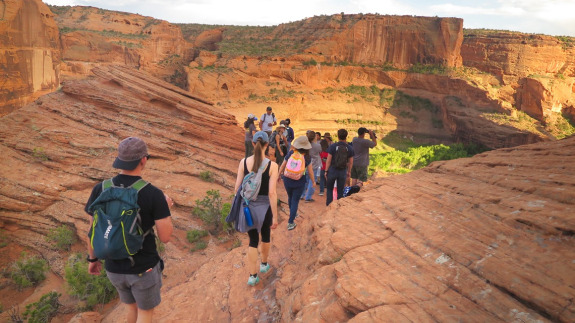
About
CALES is the heart and foundation of the University of Arizona's land-grant mission.
Founded in agriculture, rooted in life.
Uniquely positioned in the southern Arizona desert, we offer solutions to problems affecting much of the world and continue to build on our heritage of advancing the frontiers of science to improve the human condition.
From the Earth's crust to outer space, our portfolio stretches from soil and plant science to natural resource and wildlife management, retailing and fashion to biotechnology and human wellness. Our research touches on nearly every aspect of modern life and has played a pivotal role in Arizona's and the global economy for more than a century. We empower our students with the skills they need to be the next change agents in their communities through 20 undergraduate degrees and 32 graduate programs.

"CALES has remained a standard-bearer for the Land-grant University ideal of education for everybody, not only a privileged minority. Generations of our faculty, researchers and students have played vital roles as leaders, innovators, and economic drivers not only in Arizona but all over the world."
Shane Burgess, Vice President & Charles-Sander Dean
20
Undergraduate Majors
32
Graduate Programs

#2 in the U.S., #8 in the world in water resources

3,700+
Enrolled Students
30,000+
Engaged Alumni
31%
First Generation College Students
$99.3M
Annual Research Activity
Arizona ranked #7 in the nation in terms of return on investment for a college degree
Founded in 1885
Arizona's First University

46%
Underrepresented
Minorities
You want to change the world, together we can.
From devising novel technologies to nourish a growing population, to cultivating and connecting communities to foods that optimize lifelong wellness. We're committed to advancing sustainable consumer behavior, bridging social and financial disparities, and supporting natural ecosystems and wildlife in the face of a hotter, drier future.
What we do here can impact the world over.
Learn more about us
History
Our roots run deep, beginning with the founding of the University of Arizona in 1885. Throughout our history, we have evolved to meet the ever-changing needs of our students, communities, and economies.
Purpose & Promise
We're committed to the ideals of our land-grant mission: to produce employable graduates, advance purpose-driven science, and work alongside communities to improve lives and livelihoods.
Diversity, Equity & Inclusion
CALES values diversity in its people and programs and strives to foster an inclusive, fair, and respectful community.
